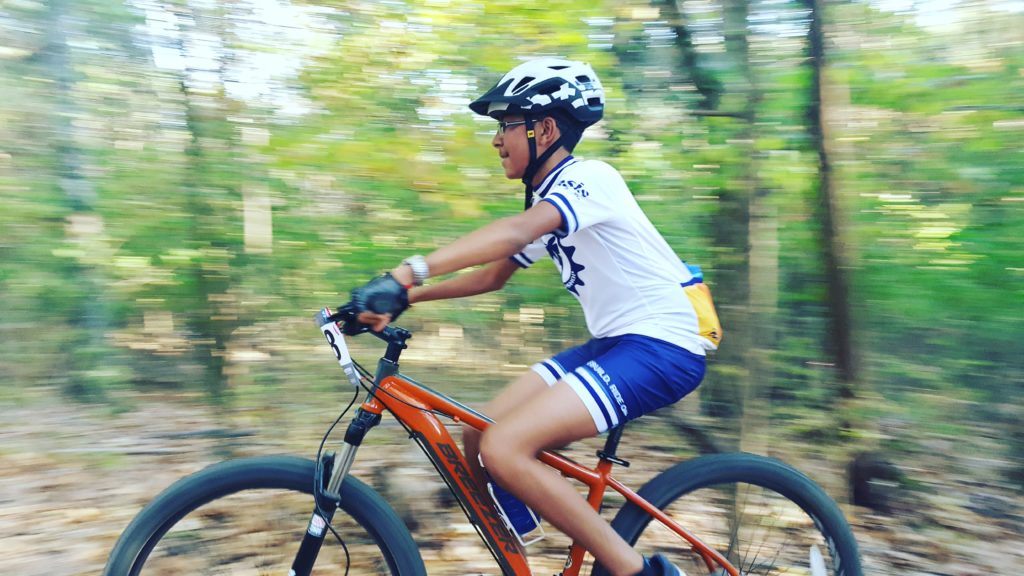
It’s late in the afternoon and a group of teenage boys pedals hard down the abandoned runway of Nashville’s old Cornelia Fort airport. They’re taking a break from the trails to work on sprints and stamina — and mock each other with shouts of “Dude, you’re so slow!”
They’re still a little green and undisciplined. Their coach, Dan Furbish, lovingly calls them the “Bad News Bears.” But a year of practice has turned rookies into racers.
“I’m going to say they’re ten times better than they were at this time last season,” says Furbish.
He teaches international kids to build bikes at the Oasis Center for youths — so they can learn a skill and earn their own wheels. A couple of years ago, he gathered a group of them into a team, just as mountain biking had become a scholastic sport in Tennessee.
Furbish admits they “basically got them these bikes and said, ‘There’s the starting line.'”
One of the boys, 14-year old George Ghabril, didn’t even know how to ride a bike back then. At the first few practices, he says he crashed into every single tree. His teammate, Saul Becerra, teases that’s not the worst of it: “You couldn’t even get
on the bike.”
A year ago the group didn’t resemble much of a team — and they really stood out at races dominated by private school teams riding expensive bikes, dressed in matching spandex.
The Oasis kids had donated jerseys that didn’t quite fit, which at first they even refused to wear. And then reluctantly put them on over hoodies and jeans. And their bikes, patched together from scrap pieces, sometimes fell apart during races.
“We used to be terrible at this. We used to all come in last place,” says Saul. “Now this time, well, some of us came in last place.”
But in the second season they had the fundamentals down and could work on technique. When co-coach Greg O’Loughlin goes over downhill riding basics, asking “Where should your butt be?” George is the first to chime in. “Behind the seat!”
Furbish and O’Loughlin have had an uphill battle. It’s not easy to mold a team out of newbie riders who cheer for one another in three languages. George is one of five members born in Egypt. Saul came from Mexico as a baby. Another rider is the first son born in the US to Salvadoran parents.
At practice, they shout over each other in Spanish, Arabic and English.
Yet despite their various backgrounds, these kids have a lot in common. They live in the same neighborhood, along the diverse Nolensville Road corridor. They were all friends at the same middle school when they started racing last year. And most of their parents can’t make it out to weekend races.
Another bond the boys share is struggling to adapt to three different high schools, where George says they don’t always fit in.
“When people at my school see me speaking Arabic, they act like I’m a new species of human!” he says. “And like 20 people have come up to me, like ‘George, what are you speaking, hieroglyphics?'”
The guys don’t mind the jokes. But racist comments like “Go back to your country” have gotten old. And Saul says, well, white kids could do the same — and go back to England, for example.
This group still has plenty of underdog charm, but their confidence has grown. Thanks to sponsors, they came into their recently-concluded second season looking like a proper team — with matching uniforms and new bikes that stay in one piece.
On race day, the boys line up shoulder to shoulder. Their faces are serious as they prepare for the ten-mile trail ahead.
When I ask Christopher Salvador, whose folks are usually the only parents at competitions, how he thinks he’s going to do, he says “great” without missing a beat. Another boy, Ishak Lamei, proudly says he’s going to ace it. Minutes later, they’re off.
As they disappear into the woods I find myself cheering hard — really hard — for the Oasis team. Maybe it’s because I too was an immigrant kid. But when Saul doesn’t hit the cut-off time for the first lap, and has to drop out of the race, I tear up a little. It happens again when George rounds a corner towards the finish line.
Something’s off. He’s pedaling like crazy but not making much headway.
His tire popped on the trail, too late in the race to be allowed to change it. But he was determined not to quit. He cranks through the flat with everything he’s got, working twice as hard as everyone else just to finish.
But George seems okay with the uneven odds. They all do.


